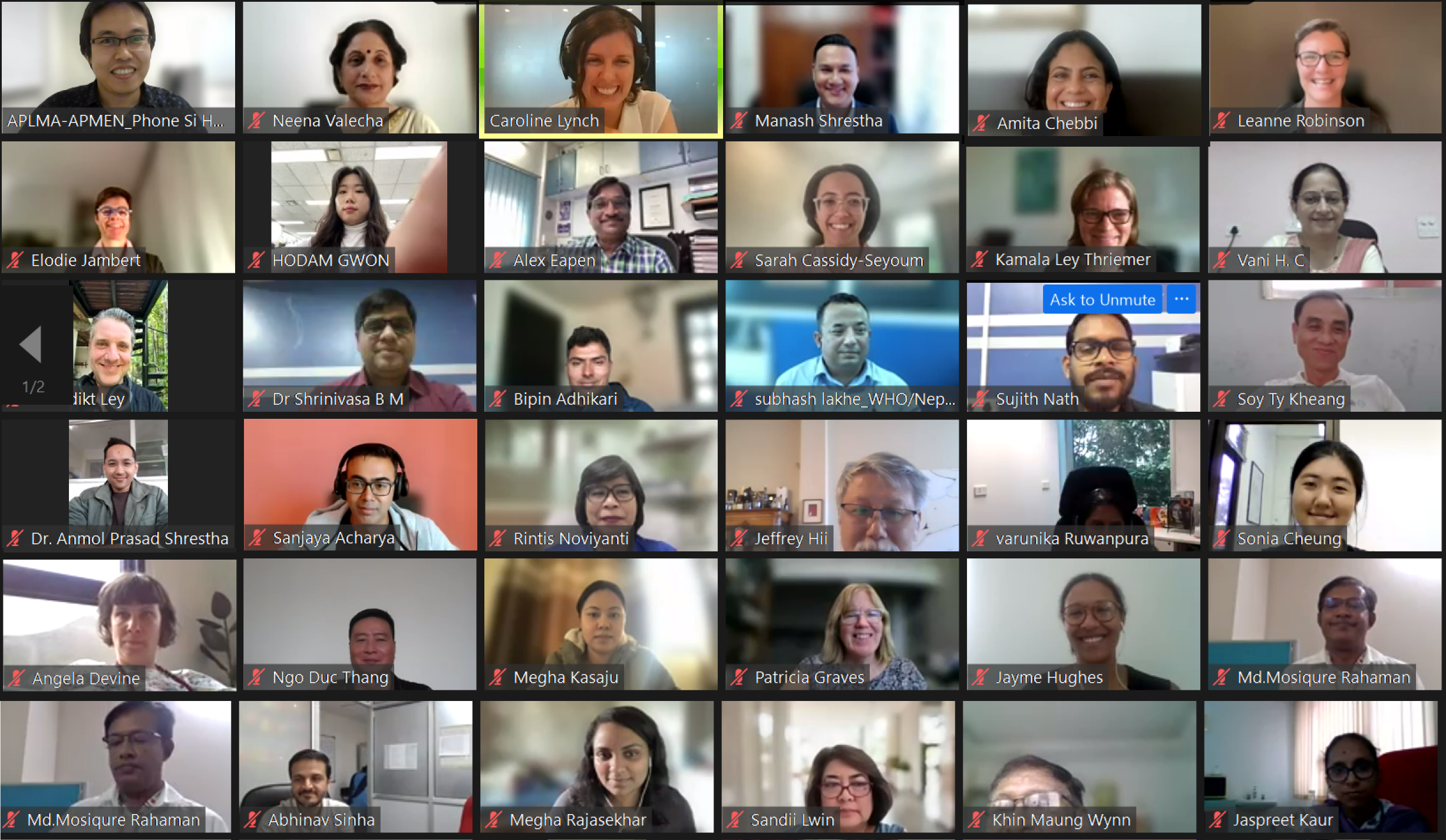
Introduction:
Addressing the unique challenges posed by Plasmodium vivax, a predominant malaria parasite, the APMEN Vivax Working Group convened its annual meeting through a virtual update on November 7th and 8th, 2023. The virtual format enabled the participation of national malaria programs (NMPs), experts, researchers, civil society organizations, and stakeholders worldwide, overcoming geographical barriers.
A total of 173 participants from 31 countries engaged in the meeting, shaping discussions based on APMEN VxWG's previous work and focusing on key priorities identified by NMPs in the Asia Pacific region.
The meeting aimed to explore the latest developments in vivax malaria research, specifically in diagnosis and treatment and to provide updates on APMEN VxWG activities and their impact on health systems affecting malaria.
“One of the challenges in vivax malaria is the detection of reservoir of infection or the presence of hypnozoites in the population, which might lead to relapses later on. For this, attempts have been made to use serological testing to detect hidden P. vivax hypnozoites.”
- Dr. Neena Valecha, the chair of APMEN VxWG
Key Sessions and Discussions:
Diagnosis:
The diagnosis session explored how Thailand is integrating G6PD testing in patient pathways for malaria case management. Discussions also centered on the potential applications of P. vivax serology in elimination settings, with reflections from NMPs on its promise and cautious considerations.
Treatment:
The treatment session covered updates on primaquine and tafenoquine, insights from various studies, and a concept note on tafenoquine prophylaxis. Notably, results from the PRIMA study demonstrated the well-tolerated high daily dose of primaquine (PQ7) reducing P. vivax recurrence in patients with P. falciparum malaria. NMP reflections highlighted logistical challenges associated with increased primaquine doses and G6PD testing, especially in resource-limited settings.
APMEN VxWG Updates:
The workplan and activities of APMEN VxWG were shared, along with progress in Pakistan following the readiness planning activity in 2022. The upcoming G6PD pilot project, focusing on field experience with point-of-care G6PD analyzers, and discussions on healthcare worker training were key highlights.
“The cascade training can be too didactic and not very participative because there is a lot of time pressure on NMPs and lots of competing priorities. So, defaulting back to traditional didactic training ends up being more of a briefing rather than a transfer of knowledge.”
“We’re also missing some key quality benchmarks that are needed, for example – pre and post-training competency assessments. At the moment, indicators are often ‘did the training take place or how many people were trained’, as opposed to ‘what proportions of the participants achieved over 85% in the post-training competency’.”
- Dr. Caroline Lynch, the co-chair of APMEN VxWG
Health Systems Impacting Malaria:
Presentations in this session covered Global Fund’s pooled procurement mechanisms, community-led initiatives for vivax malaria, and the integration of pharmacovigilance systems in public health programs.
“The work of VxWG is more critical than ever as half the malaria burden in the region is vivax. And we know that we're not going to get to the 2030 elimination goal without a strong push on vivax elimination. The work of VxWG has really evolved over the last few years from building an evidence base for radical cure to now really going further along that continuum and looking at ways to support the catalyzing of policy change and ensuring the health systems are ready to incorporate radical cure into their national strategies.”
- Amita Chebbi, Executive Vice President, Advocacy and Programs, APLMA
Conclusion and Future Outlook:
The VxWG Virtual Update 2023 received a 94% satisfaction rate in a live poll, with 97% finding the presentations and discussions highly relevant. The event, recorded on YouTube (day1 and day2), serves as a valuable resource for those who couldn't attend live.
Looking ahead, the insights gained from this meeting will guide APMEN VxWG in developing more effective strategies against vivax malaria. The commitment demonstrated by participants reinforces the collective determination to achieve a malaria-free future in the Asia Pacific region and beyond.
